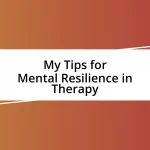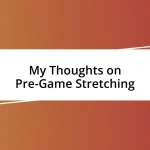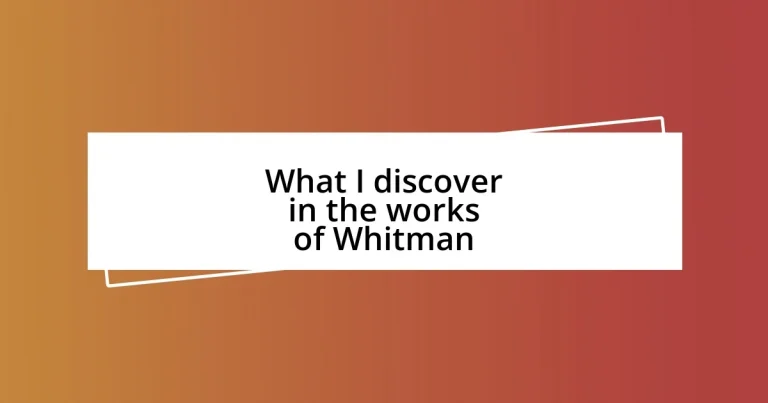Key takeaways:
- Understanding Whitman’s poetry requires recognizing the 19th-century American social and political context, including the Civil War and the shift toward industrial society.
- Key themes in Whitman’s work include individualism, democracy, and interconnectedness, celebrating diverse voices and experiences while promoting self-exploration and collective identity.
- Whitman’s use of free verse, vivid imagery, and themes of unity significantly influenced modern poetry, reflecting a legacy of inclusivity and emotional expression in contemporary literary voices.
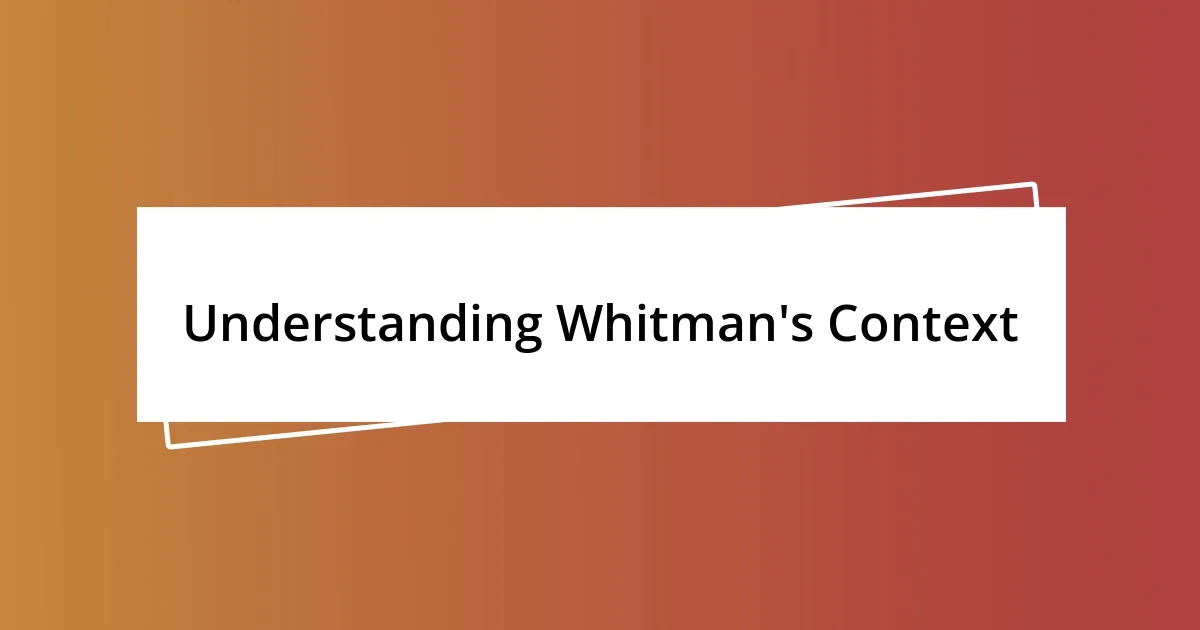
Understanding Whitman’s Context
To truly appreciate Whitman’s poetry, it’s crucial to grasp the social and political climate of 19th-century America. I often ponder how the Civil War’s upheaval and the spirit of transcendentalism profoundly shaped his worldview. Can you imagine the weight of witnessing a nation torn apart yet still believing in the potential for unity and transcendence through collective human experience?
Whitman lived during a time of immense change, where the shift from agricultural to industrial society was palpable. I remember reading “Leaves of Grass” for the first time and feeling the raw energy of that transformation pulse through his words. His celebration of the common man was not just poetic bravado; it reflected a deep belief in the American spirit and the potential for growth amid chaos.
Moreover, Whitman’s own life experiences, like his diverse career and personal relationships, fed into his poetic vision. His embrace of different cultures and people added a layer of richness to his work that I find incredibly relatable. Doesn’t it resonate when we reflect on our own life encounters shaping our perspectives? In this way, Whitman not only articulated a collective identity but also invited us into a dialogue about our individual stories within the broader narrative.
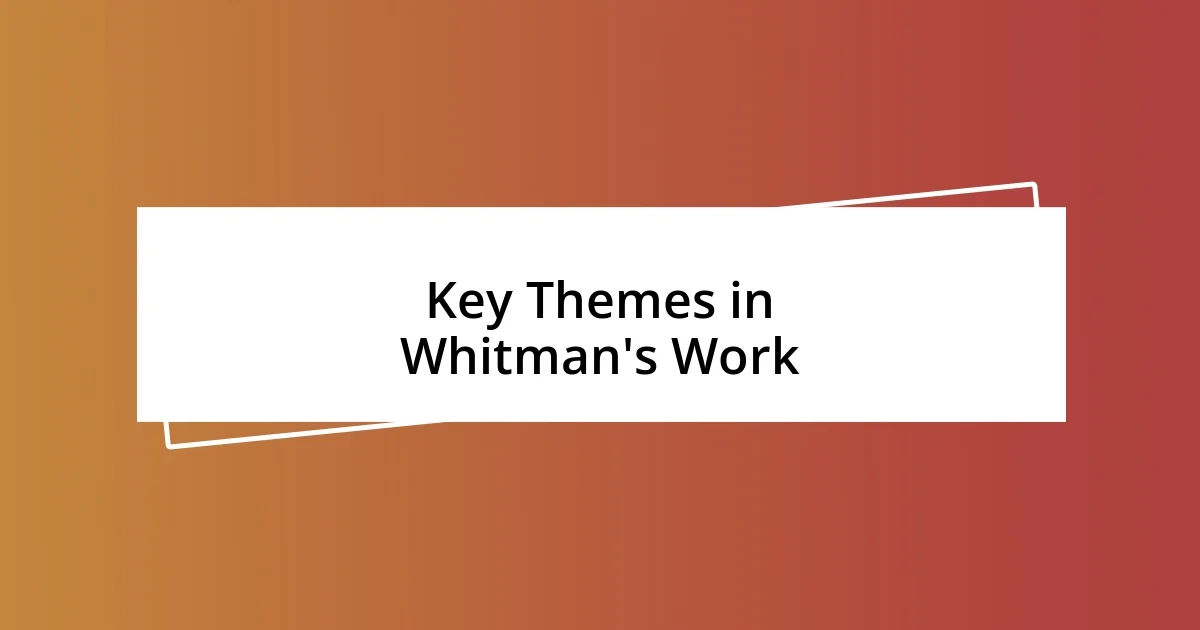
Key Themes in Whitman’s Work
Whitman’s work is deeply infused with themes of individualism and democracy, inviting readers to explore their own identities in connection with the wider world. I often find myself reflecting on his concept of the “self” as a part of a larger whole, where every voice matters. This feeling is reminiscent of moments in my own life when I engaged in community gatherings, where diverse stories intertwined to create a richer narrative. The essence of his poetry feels like a tapestry woven from the threads of countless personal experiences.
Key themes in Whitman’s work include:
- Transcendentalism: A belief in the inherent goodness of people and nature, emphasizing self-reliance and individual intuition.
- Collective identity: Whitman saw humanity as interconnected; individual experiences reflect a universal human journey.
- Celebration of the body: He embraced physical existence as a source of joy, liberation, and spirituality.
- Democracy: His poetry champions egalitarian ideals, highlighting the importance of every person’s voice.
- Nature: Whitman frequently used nature as a metaphor for personal and social growth, indicating a desire for harmony with the natural world.
Each of these themes resonates with me, often making me pause and consider the relationships I forge and the stories I share. It’s as if Whitman invites us on a shared journey, encouraging us to embrace our narratives while acknowledging the beauty in our differences.
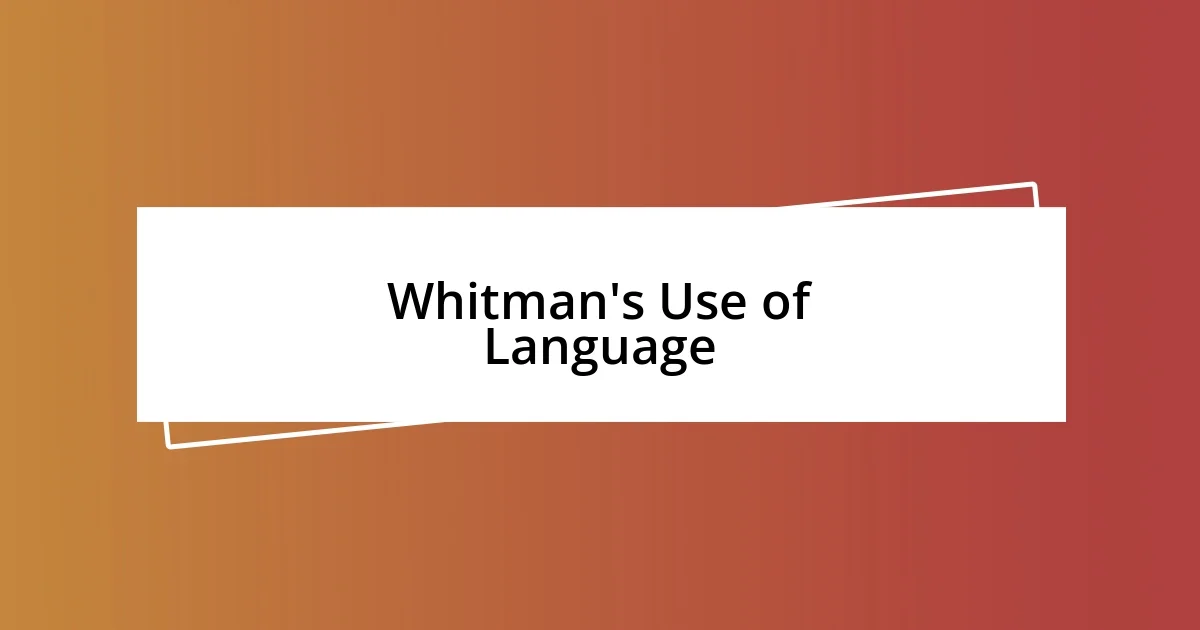
Whitman’s Use of Language
Whitman’s poetic language is truly distinctive, merging straightforwardness with a lyrical quality that captivates readers. Often, I find myself reflecting on how his innovative use of free verse allows ideas to flow organically, almost like a conversation. I remember the first time I noticed this; it felt as though he was speaking directly to me, breaking away from traditional forms and unleashing a torrent of emotion and thought.
He also employed vivid imagery and sensory details that breathe life into his verses. For example, the descriptions of nature in “Song of Myself” transport me to those very places, allowing me to feel the warmth of the sun and the rustling of the leaves. Such imagery evokes memories of my own walks in the park, where every scent and sound resonates with his words. Does it not remind you of how powerful imagery can be in connecting us to our environment and emotions?
Moreover, Whitman’s playful repetition and rhythm create a musical quality in his poetry that I often find myself humming. The way he emphasizes certain phrases or themes invites readers to pause and reflect. This aspect makes his works feel both timeless and contemporary, resonating with people from different walks of life. I often wonder how his unique language choices contribute to the way we connect with his ideas, ultimately inviting us to introspect and engage deeply with our own experiences.
| Language Element | Description |
|---|---|
| Free Verse | Whitman’s use of non-traditional structure allows a natural flow of thought, creating conversational intimacy. |
| Imagery | Vivid sensory details immerse the reader, evoking emotions and personal memories. |
| Repetition | Strategic emphasis on phrases creates rhythm, enhancing engagement and reflection. |
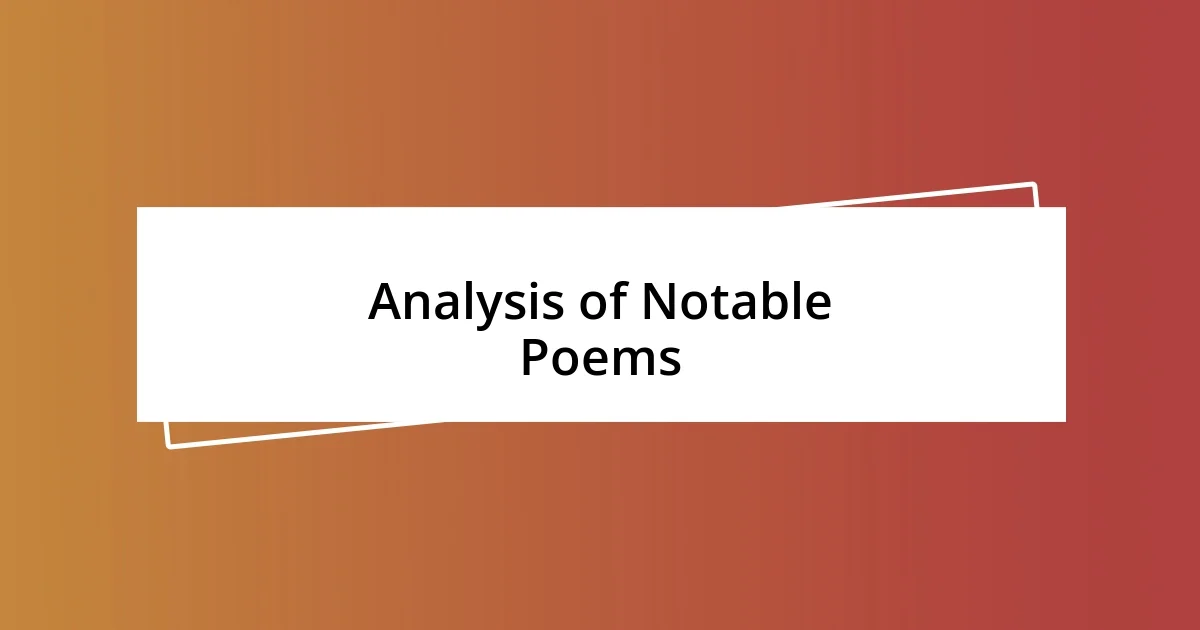
Analysis of Notable Poems
Whitman’s poem “O Captain! My Captain!” resonates with me on a deeply emotional level. The poem serves as a poignant elegy for Abraham Lincoln, reflecting a profound sense of loss that speaks to my own experiences of grief. I remember when I lost a close family member; the way Whitman captures that mixture of sorrow and admiration reminds me of the conflicting emotions I felt. How can one celebrate a life while grappling with such profound absence? Whitman expertly navigates this complexity, making it universally relatable and painfully beautiful.
Another standout for me is “I Hear America Singing.” This poem celebrates the diverse voices and labor of everyday people, a theme that feels especially relevant in today’s world. I often think about the hardworking individuals I encounter in my community—the barista who crafts my morning coffee or the delivery driver who brings packages to my door. Whitman’s portrayal of their contributions makes me appreciate the beauty in these simple acts of labor. It makes me wonder, don’t we all have our own songs to sing? I believe that by recognizing and valuing those individual “songs,” we enrich not just our lives but the collective tapestry of society.
In “Song of Myself,” Whitman embraces the notion of the self in a way that challenges traditional boundaries. The poem’s fluidity and depth serve as a celebration of individuality while also emphasizing our interconnectedness. When I reread passages from this piece, I often feel a sense of liberation, as though he’s encouraging me to fully embrace my unique journey. Have you ever felt like your story was part of something larger? Whitman highlights that sensation powerfully, urging us to recognize that we are all part of a grander narrative. This realization ignites a spark of hope within me, emphasizing the importance of our voices in the collective human experience.
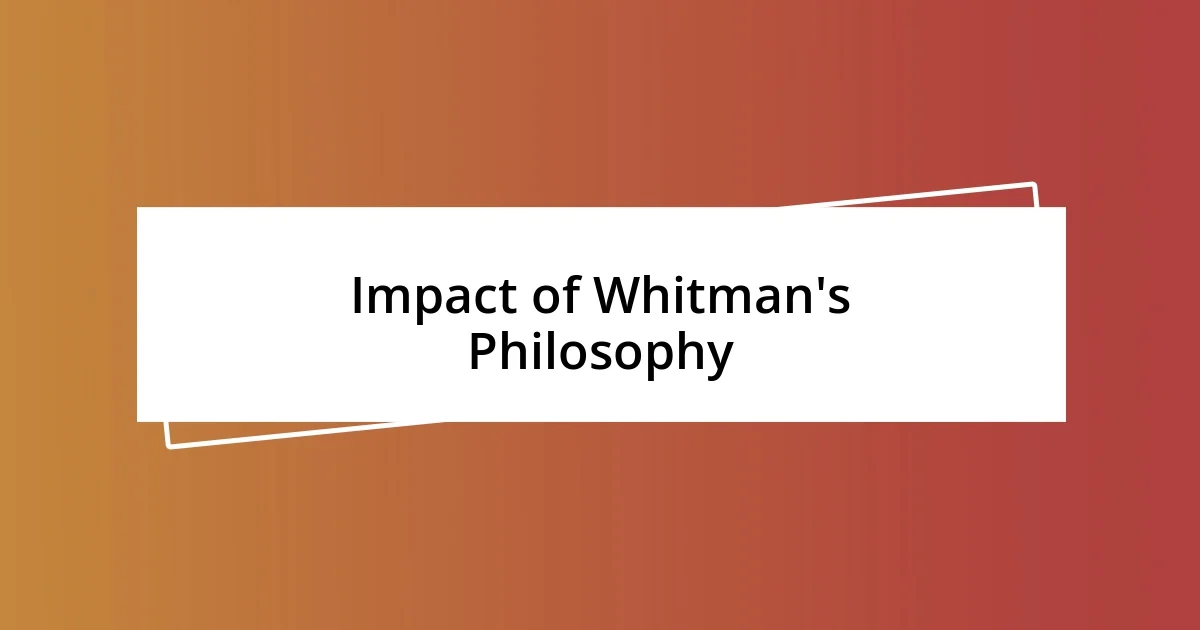
Impact of Whitman’s Philosophy
The impact of Whitman’s philosophy is profound, particularly in how he invites readers to embrace individuality. I recall a moment in my life when I felt lost among the expectations of society. Reading Whitman’s assertion that “I am large, I contain multitudes” was like a breath of fresh air, encouraging me to celebrate my own complexities. Isn’t it remarkable how his words can inspire a sense of freedom from conformity?
Furthermore, Whitman’s exploration of the interconnectedness of humanity resonates deeply with me. His emphasis on unity amidst diversity challenges us to reconsider our relationships with one another. I often think about how his vision manifests in my own life—whether I’m connecting with neighbors from different backgrounds or engaging in lively conversations about shared dreams. Don’t you feel that sense of community when you recognize the stories in others?
Additionally, Whitman’s daring approach to spirituality allows for a deeply personal connection to the universe. He encourages readers to find divinity in everyday experiences, which has shifted my perspective on life itself. I remember a specific afternoon spent in nature, surrounded by the beauty he so often describes. In that moment, I felt a sense of oneness with everything around me. Can such a simple experience reveal the interconnected threads of existence? Whitman’s philosophy resonates in such moments, reminding us of the richness found in appreciating life’s fleeting beauty.
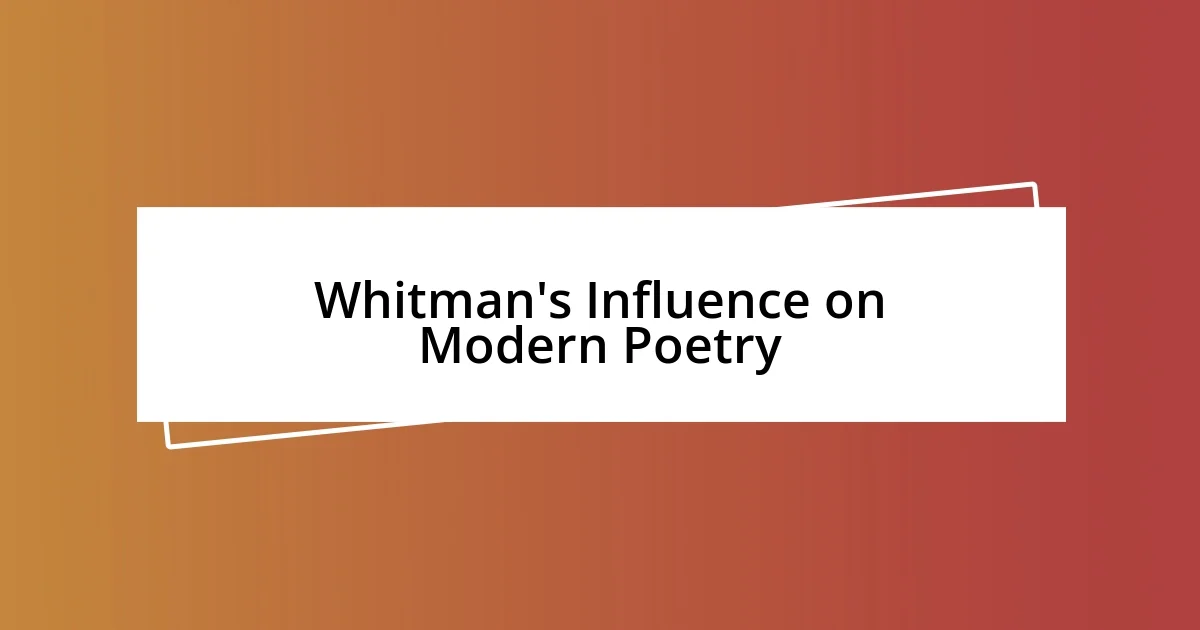
Whitman’s Influence on Modern Poetry
Whitman’s influence on modern poetry is undeniably transformative. When I think about contemporary poets, I see echoes of his style in their open forms and candid exploration of self. Just last week, I attended a local poetry reading, and one of the poets performed a piece that reminded me of Whitman’s unabashed celebration of everyday life. It struck me how these modern voices not only carry forward his legacy but also make it relevant to our current experiences. Isn’t it fascinating how one person’s voice can inspire a chorus of many?
I often marvel at how Whitman shattered conventional boundaries in poetry, paving the way for free verse. This approach has allowed modern poets to express themselves without constraints. I remember writing my first free verse poem; it felt liberating to stray from traditional rhyme and meter. In that moment, I understood how poetry could breathe with pure emotion rather than rigid structure. Isn’t it empowering to know that we can create art that reflects our innermost thoughts and feelings, much like Whitman did?
Moreover, his emphasis on inclusivity resonates deeply in today’s literary landscape, where diverse voices are more prominent than ever. I recall a workshop I attended focused on writing from marginalized perspectives. It reminded me of how Whitman welcomed all voices into his work, encouraging authenticity and empathy. The power in that inclusivity made me realize poetry can serve as a bridge between different experiences. Have you ever felt that connection when reading a poem that speaks to your life? Whitman’s legacy lives on through this celebration of diversity, invigorating modern poetry with richness and depth.
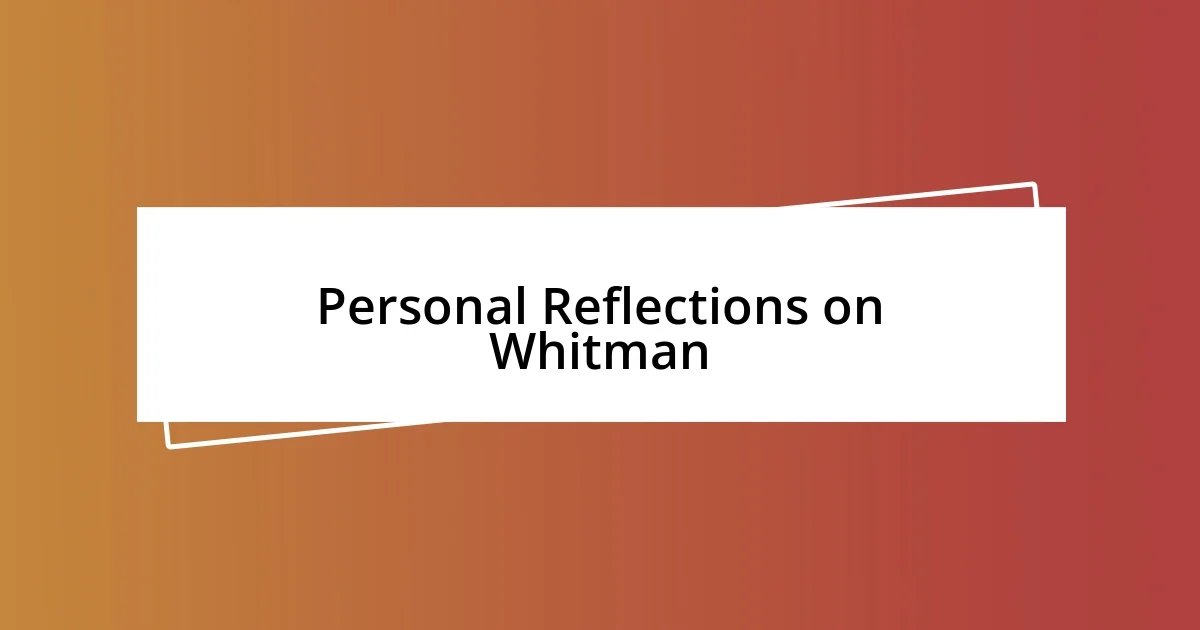
Personal Reflections on Whitman
Whitman’s works often resonate with my own journey of self-discovery. I vividly remember a period when I grappled with embracing my identity. His words about celebrating one’s true self prompted me to reflect on the layers that make me who I am. Can you recall a time when you felt the urge to break free from societal expectations? For me, Whitman’s encouragement to explore and express my uniqueness fueled my courage to share my story openly.
There’s something so uplifting about Whitman’s vision of unity within diversity. I think back to a community event I attended, where people shared their diverse backgrounds and stories. As I listened, I was drawn into that sense of relatedness he often speaks of. It was a moment of realization; our experiences, while unique, are intricately woven together. Isn’t it beautiful how we can connect through our differences, just as he envisioned?
Whitman’s take on spirituality has forever altered my understanding of connection to the universe. I recall a tranquil evening spent stargazing, inspired by his enthusiasm for nature and the cosmos. As I pondered the vastness above, I felt an overwhelming sense of peace and belonging—much like the euphoria he describes in his poetry. Have you experienced that feeling of being both insignificant and yet part of something grand? For me, those moments of quiet reflection bring his teachings to life, reinforcing that we’re all interconnected threads in the tapestry of existence.


